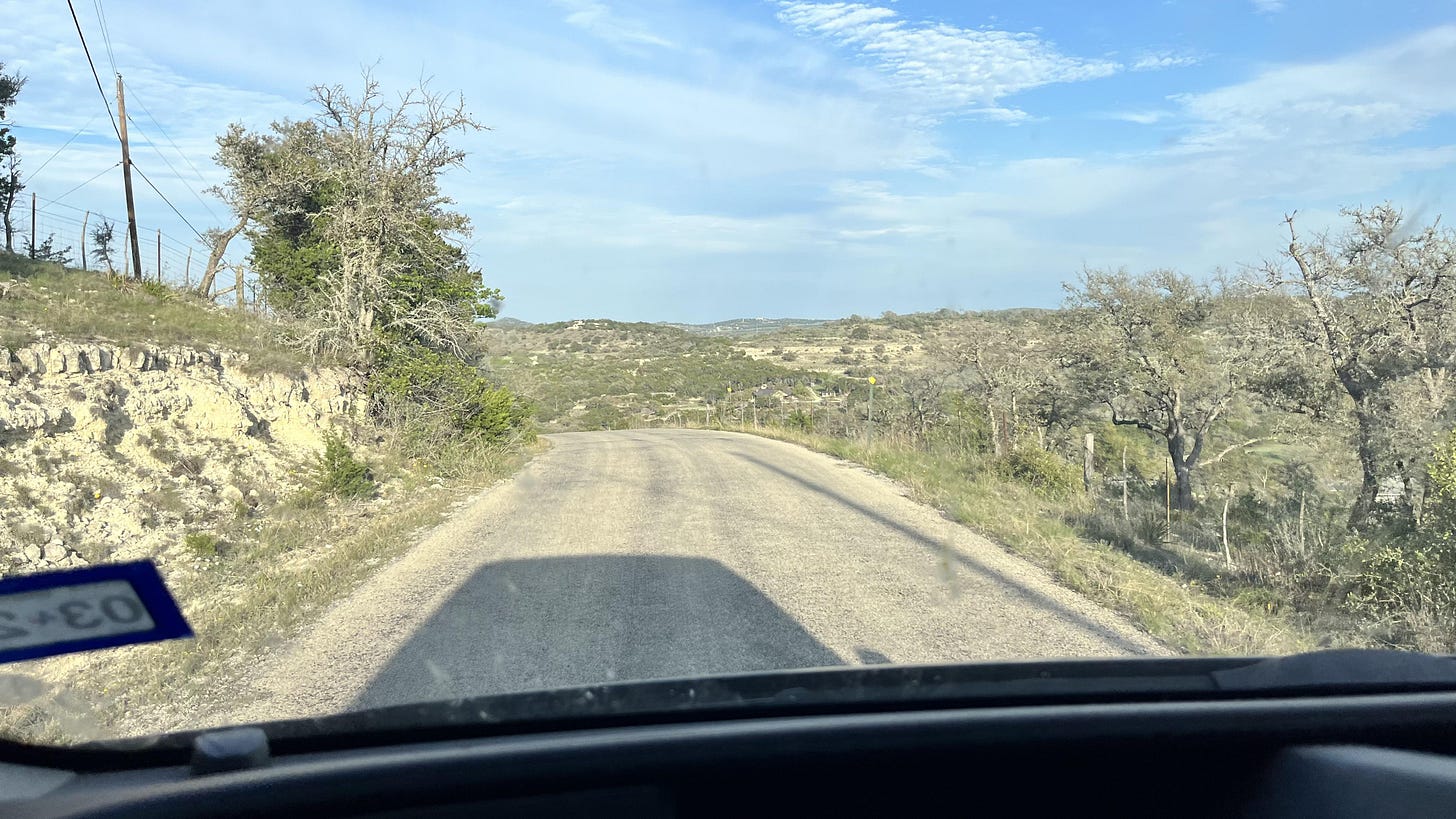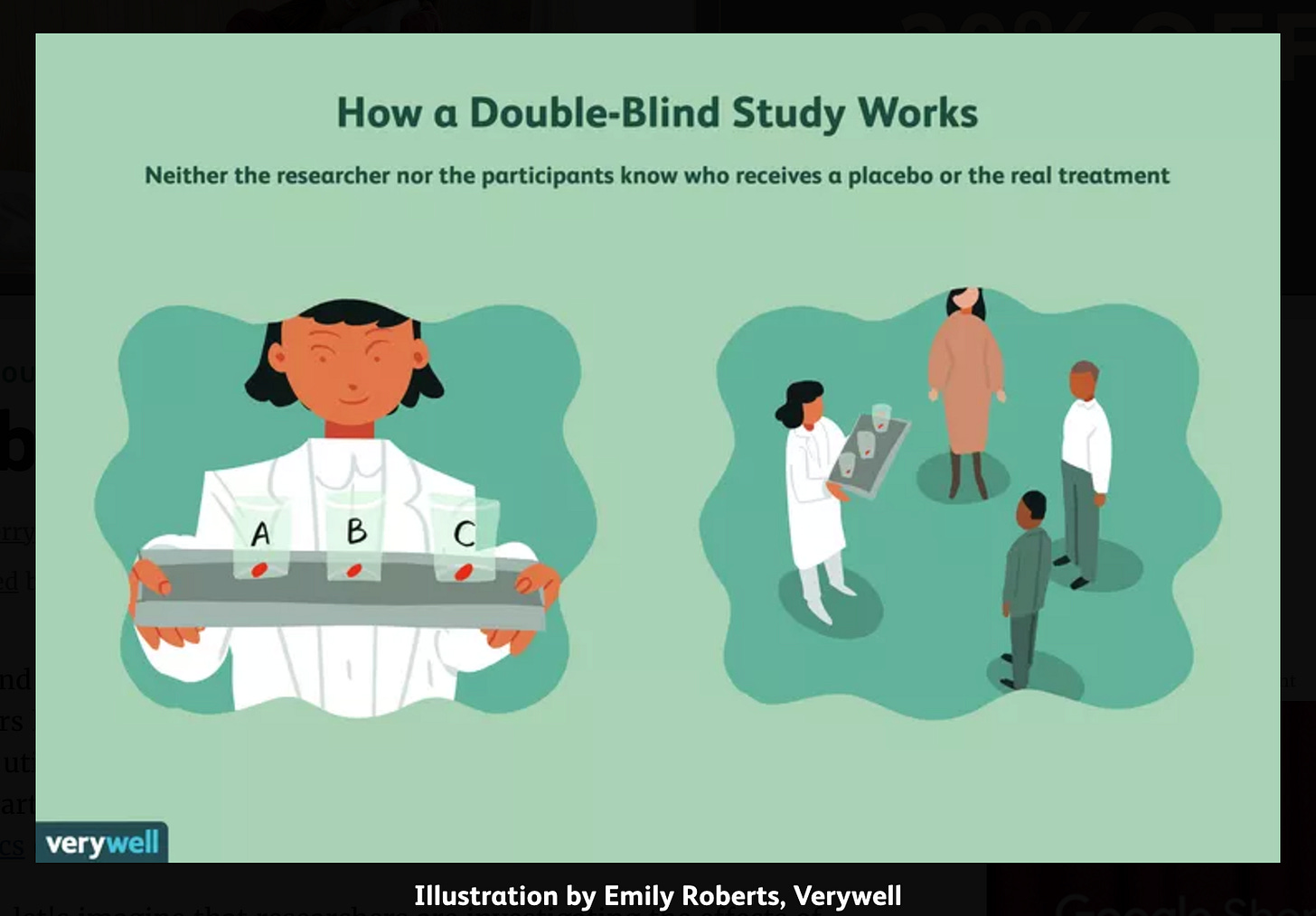Double Blind
A song unpacking.
This may be utterly unenjoyable if you do not play guitar or are uninterested in alternative tunings and songwriting.
This is the first track on my long-awaited[1] record, Texnia. I have been writing about things that have gotten in the way in this newsletter (grants, house shows, etc…). Alas, track one is out. It is called Double Blind. It was written in an open D minor[2] tuning [DADFAD].
I intend to write about some of the album's tunes as they emerge. I think of it as a written version of Song Exploder. I will know I have “made it” when I get the call from Hrishikesh Hirway to appear on his show. However, I don’t anticipate that will happen anytime soon. Thus, here we go …
The tuning and getting started
In late 2019, I started writing a collection of songs for what would ultimately become Texnia. Around this time, a buddy suggested I try writing in alternate tunings. He knew I was not a great guitar player and thought this could help me avoid ruts. I went with it and ultimately wrote most of the album this way. I used a new tuning as a jumping-off point for starting to write something, and at least early on, I had no idea the chords my fingers were making. I used Joni Mitchell’s tuning patterns as my initial inspiration/starting point.
Over the next year, I wrote a few songs in this Open D minor tuning. They all sound dark and “modal” or just plain moody. Last summer, I taught a seminar on Alt tunings at the Olde Town School of Folk in Chicago, and I suggested to the students that if they want to write a dark song, this would be an excellent place to start; in my experience, it will be tough to do happy in it!
Oddly, because I was doing some songs in a C9 tuning (CGCGCD), I wrote Double Blind tuned down to open C minor with a capo on at the 2nd fret (creating an Open D Minor starting point). According to the voice memo app on my phone, I started writing it on May 29th, 2020. Here is that version.
It includes a decent representation of the verse melody and has some higher-pitched voice scatting. Listening to this now, four and a half years later, I did not realize that voice scatting bit would be in there, and it sounds a bit like what became of the outro.
At least at this stage, the voice delivery has a little more of a talking/mean vibe about it. I have always been enamored with Ambulance Ltd’s Primitive (The Way I Treat You).
His staccato delivery and bravado are magic. Sometimes, I try to have that in my head when I am working on a tune, but it never comes out right. I was probably trying here, but I can’t remember. Indeed, in later versions, I ultimately got away from that.
The song is in G minor, though I was not thinking about that then. I was not thinking about chords at all at the time. Perhaps today, 15 songs into the tuning, I could start to think about some chords in this tuning, but it took me a while to get there. That is a rad thing about alternative open tunings: they often sound good when you only do a few simple things. I was doing that. Here is a video of me playing an early version of this song without the bridge.
You can tune your guitar up at home and do what I do, and it will sound alright!1
Lyrics and Content
The exact lyric file for the song is here. It was started on June 3, 2021, based on the timestamp of my hard drive a few days after the initial voice memo. I use the method of never throwing anything away. Thus, the older stuff is at the bottom of the page, and the newer (usually close to the final version) is at the top. I don't know what book I read that advocated for this[3], but I have seen it a few times. The file itself includes all my notes to myself as well as feedback (workshopping sessions) from other writers.
I say this to students and early songwriters all the time: sometimes songs “pop” out, but often it takes weeks, months, and years of really working at them to get into the form you know and love them as. In other words, not everyone will have the experiences Bob Dylan has had, "I don't know where my songs come from," Dylan said. "It's like a ghost is writing a song."2 However, the more you go through the process of writing (like Dylan), the more you will be able to receive something like Dylan describes. I share the full lyrics and all the versions of this song, Double Blind (that I still have), to show what it took to get from the initial demo to the final version. Importantly, most music fans don’t want to hear about those weeks, months, and years, and thus, Song Exploder never covers them.
John Craige on his most recent live album talks about a version of this idea and says that musicians will tell you about a songs, “conception” story where humans will tell you the “birth” story when it comes to having a baby. You can listen to it here.
In the first phone recording of Double Blind, it sounds like I am saying, “No, he never held her tight / never even said goodbye,” and then something like, “and you Use (d) to her name.” At this stage, words are often meaningless, and sounds are essential. Though, there is some kernels that stuck around in this. The idea of “never” and “using” and it being about a relationship stand out as I look back at it now.
At some point, the song became about being a workaholic and prioritizing things that you think will make you happy with things that probably don’t. The song does commit a cardinal sin if you are a publisher and professional songwriter: the title is nowhere to be found in the lyrics, let alone a vital and memorable part3.
I liked the idea of a Double-Blind. Around this time, a friend wrote and showed me a tune called “Blind Corner.” It used driving as a metaphor to talk about a relationship; you never know what lies behind a blind corner.
Photo by ItsMeYourAmazonGuy4
I spent a lot of time thinking about that image, then started to think about the person on the other side of the blind corner in the song my friend wrote, and then I began to think about Double-Blind Studies, where no one involved knows what is happening.
I thought that was an interesting foundation for a relationship where someone is in a relationship. Still, their priorities are off – they cannot see that said priorities are off – and they can not see the effect it is having on their partner, who also has a relationship with this person with mismatched priorities and a relationship with themselves.
As the lyric file shows, I tried to incorporate this “Double Blind” lyric into the song but ultimately had to eliminate it in favor of something that more simply told the story, to the extent that there is one.
Production
You can find every version of Double Blind, from the first demo to the final version, including everything referenced in this article, in order, here.
My phone recording indicates that I worked steadily on the song between the first demo and June 15, 2020, when I had a version called “Double Blind Bloom V11,” a full version of the song.
At this point, I was grappling with that title issue and considering changing it to “Bloom.” I guess that was lost along the way as well, along with the version of the bridge that is in this demo. It would ultimately be replaced with something that I think gets at the heart of the issue which is the endless cycle and helplessness that the workaholic protagonist gets themselves stuck in.
From here, the song was sent to Max Hart, who produced the record. We were going to meet at a studio and do most of the recording live (like they used to do), but the pandemic scuppered that. We waited until winter 2021 and ultimately decided everyone would record parts remotely and file share. He eventually removed all the guitar parts, replaced them with piano, Moog, and synths, and sent the files to Eric Gardner to record drum parts. The versions of the songs I still have from this period where files were being bounced around start at V2.5 Double Blind V2.5 (bridge extra measure).
Generally, it was a linear process that started in February of 2021 and lasted several months. The final version I have from Max, before it was mixed and mastered is Double Blind V13; it is time stamped May 4, 2021 - nearly one full year since the demo was started5.
Looking back at all the files, it seemed that I missed some of the vocal stuff from the very original demo, and in April of that year, I sent a “solo idea” file to Max using my voice.
Maybe some of this is ultimately in the outro or little bits in the Bridge section.
The Volume Swell at 30 Seconds
There is a volume swell at about 30 seconds on the final track. It happens as the lyrics talk about “sky/high” which I think is fitting for a swell. However, I am not sure if this moment was intended. I was not in the studio the day it was mixed. They may have thought this was fitting or it may have been a mistake. I never asked. It is one of those things that certainly could be “fixed” and likely would never have happened if the album was made using more digital plugs ins and tools, but I do not mind it, and I like the idea that either way this is an artifact of humans being involved at various (‘neh every!) stage of the process.
If my own memory serves, Chuck Klosterman in his book Fargo Rock City talks about loving a part of some song that is simply finger noise on a guitar. He theorizes this part was likely a mistake and not something the guitar player liked, but he—Chuck— loved it. If nothing else, it is part of the song6. Certainly, in 2024, any studio in the world can fix almost anything, but it is nice sometimes when they don’t — I think.
Picture Hrishikesh Hirway saying, “And now, after a word from our sponsors, you can listen to Double Blind in its entirety.”
[1] To me.
[2] The saddest of all tunings?
[3] It might have been Pat Pattison
Note: this was very soon after I “learned” the song, and really didn’t know the chords well. I “get” the chords especially that first change better as the song goes along.
https://www.theguardian.com/music/2012/apr/06/neuroscience-bob-dylan-genius-creativity
I can hear a chorus of my songwriter friends saying, “But how will they remember it and look it up!?”. To that I say, “Any of us should be so lucky to have that problem!”
https://www.reddit.com/r/AmazonDSPDrivers/comments/1bn66g9/ah_yes_the_single_lane_two_way_blind_hill_blind/
It would be two more years before the songs were mastered. Mixing took place in between.
I looked for this quote online to no avail; my copy is in storage. If anyone reading this has it, please give me the citation or tell me my memory is shite!




Thanks @Kevin Alexander :)
Awesome write-up. Hearing the audio clips from as the song progresses along with the notes of how the decisions and process unfolded is super interesting